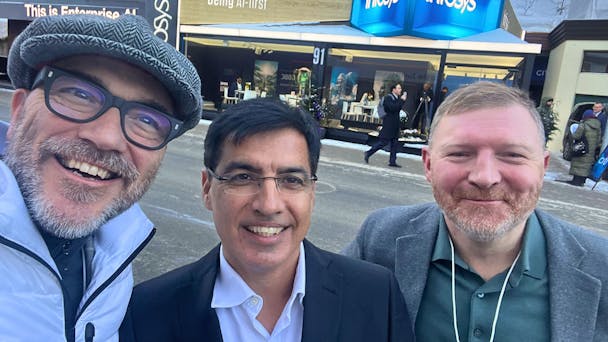Notes from Davos: AI truly dominated the World Economic Forum
The Drum’s editor-in-chief comes fresh from Davos with the lowdown on how power brokers talk about AI. Buckle in; these conversations will shape the marketing world in 2024.

/ Featuring Gordon Young, Sumit Virmani, Steve Antoniewicz
The rumblings of AI will no doubt still echo through the Landwasser Valley. Last week, Davos became the tech capital of the world as it played host to the World Economic Forum.
The local shops were commandeered by the world’s big tech companies, and the founder of Open AI, Sam Altman, was in town to give the speech, which many deemed the highlight.
What the rise of this technology will mean was the common thread that united all attendees. The 1% of the 1% who arrived by helicopter, touched on it as they pondered geopolitics, and on the fringe, it dominated even as delegates pondered the rip-off pricing.
There is no doubt that AI is more than a fad. It is the most disruptive new technology we have perhaps seen in our lifetimes. You can be as cynical as you like about a Davos consensus, but ignore this at your peril.
Explore frequently asked questions
Jeremy Hunt, the UK’s chancellor of the exchequer, was just one of the leading politicians to talk about AI, arguing that it poses more opportunities than threats, which is why light touch regulation is key. “You can kill the golden goose before it has time to grow,” he said. “As a politician, I look at the problems that we face, such as the next pandemic, and we don’t want to have to wait a year for the vaccine. If AI can shrink that to a month, that is a massive step forward.
“But we have to keep our eyes open – we also need guardrails to make sure a rogue actor isn’t going to be able to use gen AI to build nuclear weapons.”
From warfare to healthcare, in other words. AI is a topic that almost defies perception; like the universe, it is infinite. Whoever you spoke to, whatever the topic, it seemed pertinent.
Nicola Mendelsohn, head of the global business group at Meta, was a case in point. She told me AI is a game-changer, citing Meta’s metaverse investment as an example. “You cannot fully recognize the vision of the metaverse without having AI.
“It is a fundamental building block - otherwise, it would always require someone to be an expert coder to build the world. Whereas you want to be able to say to your AI assistant - make me a pub in England where I can go with my friends. We are not there yet, but we always spoke about this as being a decades-long journey.”
There are many obvious applications for AI, from copywriting to graphic design. New ways of using the tech are emerging all the time.
Advertisement
For example, I will remember Davos as the place where I first heard the expression ‘4th party data’. I have Dan Gardner, CEO of Code and Theory, to thank for that. He points to a system where AI systems will effectively create digital twins of consumers and customers.
The system will then be able to give instant insights into their preferences or perspectives on new products or services.
A sobering thought for the research industry. But most at Davos, believe that no matter what, the march of AI is unstoppable. The only option is to lean in.
Speaking on a panel arranged by The Drum and the Financial Times on how AI might empower marketers to change the world, Matt Candy, head of generative AI at IBM warned, “I do think people who don’t use these tools will be replaced by people who do use them.”
However, according to Sumit Virmani, global CMO, of Infosys [pictured above], this does not necessarily mean the future belongs to computer nerds. Speaking on a panel I moderated, which asked why so few CMOs become CEOs, he said, “In a world where there is going to be a lot of democratization of competition thanks to technology and a wide availability of data differentiation is going to come from innovation and creativity. “
Advertisement
But despite this window of opportunity, the marketing voice seemed muted at this event. Some leaders, such as Sir Martin Sorrell and Nigel Vaz, were in town, but their profile was low. The marketing industry has seemed to surrender the ground to big tech and big consultancies.
Davos is eye-wateringly expensive but is still a serious event tackling serious issues. If the marketing industry wants to be taken seriously, it needs to be better represented there, regardless of the cost.
Gordon was at CES earlier this year and has shared his top innovations from the event.

